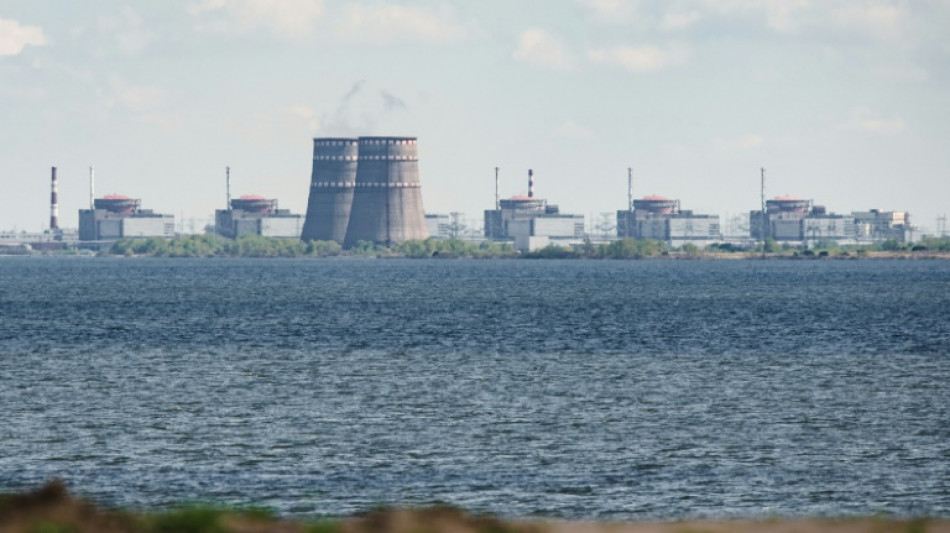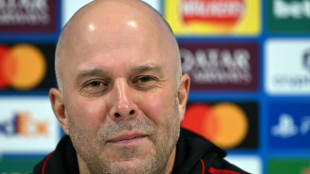
-
 Japan PM's tax giveaway roils markets and worries voters
Japan PM's tax giveaway roils markets and worries voters
-
Amid Ukraine war fallout, fearful Chechen women seek escape route

-
 Rybakina surges into Melbourne semis as Djokovic takes centre stage
Rybakina surges into Melbourne semis as Djokovic takes centre stage
-
Dollar struggles to recover from losses after Trump comments

-
 Greenland blues to Delhi red carpet: EU finds solace in India
Greenland blues to Delhi red carpet: EU finds solace in India
-
Will the EU ban social media for children in 2026?

-
 Netherlands faces 'test case' climate verdict over Caribbean island
Netherlands faces 'test case' climate verdict over Caribbean island
-
Rybakina stuns Swiatek to reach Australian Open semi-finals

-
 US ouster of Maduro nightmare scenario for Kim: N. Korean ex-diplomat
US ouster of Maduro nightmare scenario for Kim: N. Korean ex-diplomat
-
Svitolina credits mental health break for reaching Melbourne semis

-
 Japan's Olympic ice icons inspire new skating generation
Japan's Olympic ice icons inspire new skating generation
-
Safe nowhere: massacre at Mexico football field sows despair

-
 North Korea to soon unveil 'next-stage' nuclear plans, Kim says
North Korea to soon unveil 'next-stage' nuclear plans, Kim says
-
French ex-senator found guilty of drugging lawmaker

-
 US Fed set to pause rate cuts as it defies Trump pressure
US Fed set to pause rate cuts as it defies Trump pressure
-
Sleeping with one eye open: Venezuelans reel from US strikes

-
 Venezuela's acting president says US unfreezing sanctioned funds
Venezuela's acting president says US unfreezing sanctioned funds
-
KPop Demon Hunters star to open Women's Asian Cup

-
 Trump warns of 'bad things' if Republicans lose midterms
Trump warns of 'bad things' if Republicans lose midterms
-
Russian strikes in Ukraine kill 12, target passenger train

-
 With Maduro gone, Venezuelan opposition figure gets back to work
With Maduro gone, Venezuelan opposition figure gets back to work
-
Celebrities call for action against US immigration raids

-
 Rubio to warn Venezuela leader of Maduro's fate if defiant
Rubio to warn Venezuela leader of Maduro's fate if defiant
-
Denver QB Nix 'predisposed' to ankle injury says coach

-
 Lula, Macron push for stronger UN to face Trump 'Board of Peace'
Lula, Macron push for stronger UN to face Trump 'Board of Peace'
-
Prass stunner helps Hoffenheim go third, Leipzig held at Pauli

-
 Swiss Meillard wins final giant slalom before Olympics
Swiss Meillard wins final giant slalom before Olympics
-
CERN chief upbeat on funding for new particle collider

-
 Trump warns US to end support for Iraq if Maliki returns
Trump warns US to end support for Iraq if Maliki returns
-
Judge reopens sexual assault case against goth rocker Marilyn Manson

-
 South Korea's ex-first lady to learn verdict in corruption case
South Korea's ex-first lady to learn verdict in corruption case
-
Rosenior dismisses Chelsea exit for 'untouchable' Palmer

-
 Markram powers South Africa to win over West Indies
Markram powers South Africa to win over West Indies
-
Vladimir Padrino: Venezuela's military power broker

-
 Amazon closing Fresh and Go stores in Whole Foods push
Amazon closing Fresh and Go stores in Whole Foods push
-
Koepka nervous about game and fans in PGA Tour return

-
 Trump's Iowa trip on economy overshadowed by immigration row
Trump's Iowa trip on economy overshadowed by immigration row
-
Dortmund coach says Inter Milan are improved under Chivu

-
 US border chief in Minneapolis as Trump tries to calm crisis
US border chief in Minneapolis as Trump tries to calm crisis
-
What to know about America's colossal winter storm

-
 Iran warns against 'instability' after US strike group arrives
Iran warns against 'instability' after US strike group arrives
-
GM reports quarterly loss but boosts shareholder returns

-
 US banks fight crypto's push into Main Street
US banks fight crypto's push into Main Street
-
NFL Bills make offensive coordinator Brady new head coach

-
 TikTok settles hours before landmark social media addiction trial
TikTok settles hours before landmark social media addiction trial
-
Newcastle braced for 'ultimate test' against PSG after storm disruption

-
 Brook blitz ends Sri Lanka's unbeaten home run, England clinch series
Brook blitz ends Sri Lanka's unbeaten home run, England clinch series
-
LVMH 2025 net profit drops 13% to 10.9 bn euros

-
 Philip Glass pulls Kennedy Center premiere after Trump takeover
Philip Glass pulls Kennedy Center premiere after Trump takeover
-
Slot says Liverpool must fix 'very bad cocktail'


Standoff at strategic Ukraine river eyed by Russian troops
On the municipal beach at Nikopol in southern Ukraine, barbed wire, sand bags and other defences have replaced children playing on the sand.
Bang opposite, the Russians control the other bank of the Dnipro, the river that divides Ukraine between east and west.
Planted in the sand is a slightly rusty sign asking people to pay attention -- a polite warning requesting not to disturb a neighbour relaxing on a towel, to keep a ball under control.
It is a reminder of carefree days before February 24 when Russia invaded Ukraine.
Then at the beginning of March, Russian troops captured Energodar, the largest nuclear power plant in Europe, located just opposite Nikopol.
Clashes at the plant raised the spectre of a catastrophe similar to that of Chernobyl in 1986.
But apart from a burned out administrative building, the six reactors seemed intact when Russian troops took journalists on a tour.
For Nikopol's residents, the broad expanse of the Dnipro has become a natural border with the Russians.
"It's forbidden to enter the water. It's too dangerous," a soldier told AFP.
On the beach, everything appears ready to take on enemy soldiers if they decide to cross the river, with barbed wire and sand bags stacked high.
- Repeated setbacks -
At a nearby sports club, the owner Alexander Zagrydny, has set up a telescope that allows members to survey the other bank.
"We no longer see Russian armoured vehicles. We're a bit relieved," he said.
But he's frustrated that he can no longer sail.
"I cannot imagine my life without the Dnipro. I have been navigating it since I was a child," sighed the athletic 50-something whose wife left Nikopol with other residents to avoid the risk of war.
Control of the Dnipro was seen as a major Kremlin objective in the first days of the war.
Some 2,300-kilometres long, the river, which rises in Russia before meandering past Belarus, travels more than 1,000 kilometres (600 miles) through Ukraine to the Black Sea.
"Once you control the points of passage along the Dnipro, that gives you real freedom of action between the east and west of Ukraine," said a Western military expert at the end of February when the Russian army seemed poised to conquer Kyiv.
But Russian troops met with repeated setbacks on the northern front and withdrew to concentrate on Donbas, the eastern territory where Russian-backed separatists have been at war with Kyiv since 2014, and on the south.
- 'Defensive boundary' -
"While before there was perhaps talk about how Russia would move up to the Dnipro trying to lock that down and proceed westward, now it looks more like a defensive boundary that can help Russia fortify what it already has," said Andrew Lohsen, an analyst for the the Center for Strategic and International Studies in Washington.
To take the Dnipro river cities of Zaporizhzhia and Dnipro, whose pre-war populations numbered 800,000 people and one million respectively, "would be very difficult combat considering how poorly they failed in other attempts to take cities," he said.
Unless of course, the Russians destroy these cities like the southern port of Mariupol, Lohsen said, pointing out that Zaporizhzhia has one of the six hydroelectric dams on the river, whose destruction would trigger catastrophic consequences as the Energodar nuclear power plant lies dozens of kilometres downstream.
Anatoliy Kovalyov, the rector of the Odessa National University of Economy, said the Dnipro is a lifeline for Ukraine and accounts for 10 percent of total electrical output.
Thirty bridges link the east, rich in mining resources, with western Ukraine, where they are processed and transformed.
"Ukraine's entire economy depends on transport" between the two banks, Kovalyov said.
"The most important task" for the Ukrainian forces now is to "protect the bridges", which will guarantee the preservation of a "solid and united state."
O.Bulka--BTB




